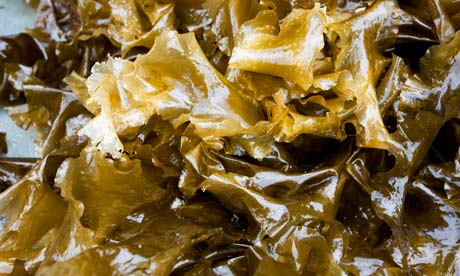“It’s best to get it out of the water now or it’ll start getting grazed by the little beasties,” says Lars Brunner as he hauls 50kg of glistening, translucent kelp from the dark waters of the Sound of Kerrera into the boat. The long summer days mean the seaweed is rapidly storing up sugars, which snails and barnacles find delicious.“You can eat it, but whether it tastes good is debatable,” says Brunner. He is also after the sugars, but for a different reason. His work at the Scottish Association for Marine Science (Sams), with parallel projects in Ireland and Norway, is part of a growing worldwide effort aiming to turn the centuries-old seaweed industry into a major source of environmentally friendly biofuels.
The seaweed is farmed in a picture-perfect sea fjord that once hosted a fish farm, near Oban in Argyll, where craggy, green hills overlook the loch. “It’s a very good site,” says Brunner. “It has really nice currents; the seaweed needs the water to flow over the blades so they can capture the nutrients they need.”
Many millions of pounds are being invested in seaweed research from Vietnam to Israel to Chile because producing biofuels in the sea removes at a stroke many of the serious problems with conventional biofuels. Though important as greener alternatives to oil, many biofuels are produced from food crops, such as corn and sugar, which drives up global prices in a world where a billion people are already hungry. Biofuel production also consumes increasingly scarce freshwater and the worst examples – those from palm oil – can produce more carbon dioxide than diesel.
“Seaweed does not have any of those problems,” says Phil Kerrison, another marine scientist, back at the Sams labs. Seaweed farming has even been shown to clean up the pollution from fish farms and kelp grows far more quickly than land plants, turning sunlight into chemical energy five times more efficiently.
Kerrison pulls a square of plush red carpet from a tank, strewn with the tan-coloured kelp. “Carpet is very good as a growth substrate,” he says. “It has a rough surface, but then it also holds a lot of water making it very heavy and putting strain on the moorings.” His task is to find the best material to farm the seaweed on, but he is cautious of revealing too much as there are significant commercial interests at stake.
via Seaweed biofuels: a green alternative that might just save the planet | Environment | The Guardian.
Seaweed biofuels: a green alternative that might just save the planet

No comments:
Post a Comment